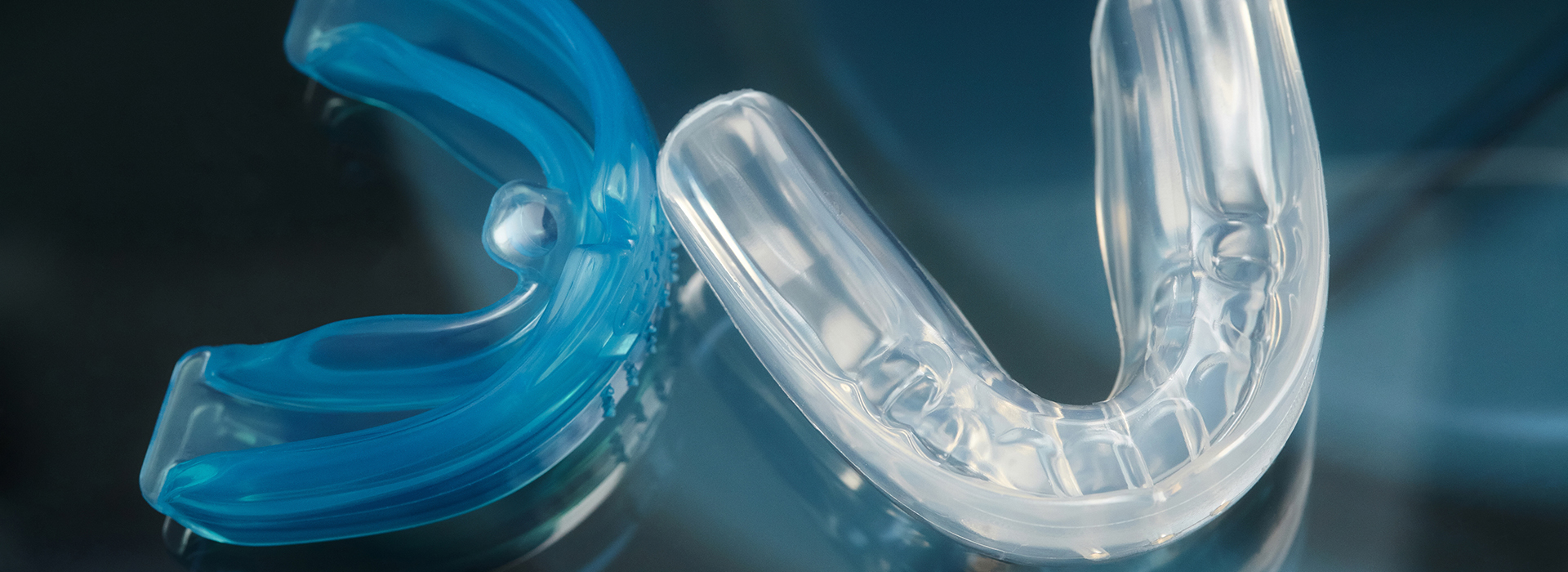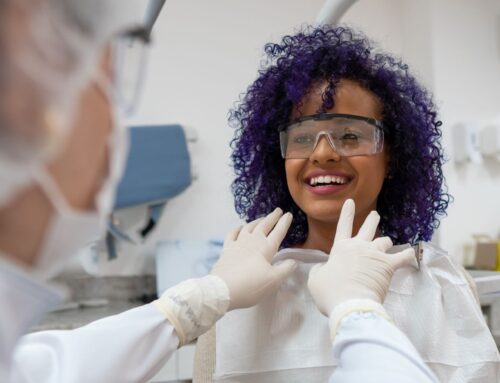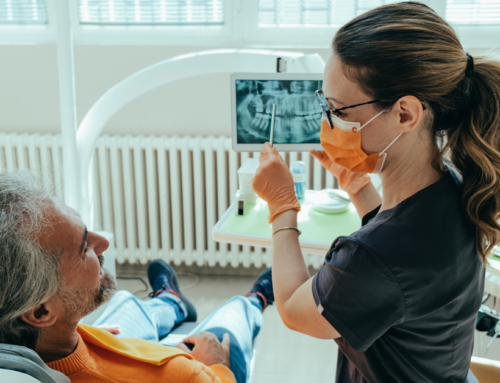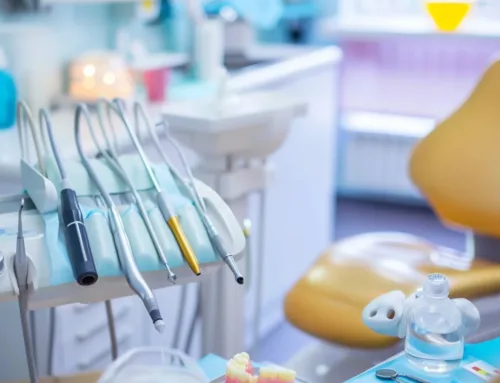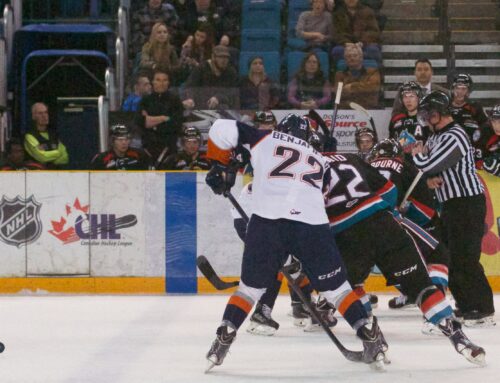Keep Your Teeth Safe with a Dental Mouthguard for Sports
When playing contact sports and other physically intense activities, it’s vital to use protective equipment to help prevent injuries. This could include a helmet for your head, gloves for your hands, pads for your knees or elbows, glasses or goggles for your eyes, and many other pieces of sports gear. To protect your mouth against potential injury, you’ll need a properly fitted dental mouthguard for sports like hockey, football, and others.
We all want to have a great looking smile that makes us feel confident and self-assured, so we take many steps to ensure that our teeth and mouth stay healthy and strong. These steps include such things as our at-home oral care routines, regular checkups with our dentist, hygiene treatments, up-to-date x-rays, and restorative dental procedures to take care of small problems before they become big ones. The list goes on, but one of the most important things you can do to keep your smile in great shape is to protect it against accidental impacts that may cause damage by using a dental mouthguard.
There are many types of dental mouthguards to consider for contact sports like hockey and football, with each offering different levels of protection. Choosing the right dental mouthguard depends on the type of activities you intend to participate in, the current state of your dental health, and the amount of protection you will need. This is because there are multiple ways that your teeth or mouth can become injured or damaged while playing sports or engaging in intense physical activities. Let’s take a quick look at some of the most common injuries to the mouth that occur in contact sports such as hockey, rugby, football, and others.
Common Sports Injuries to the Mouth and Teeth
Loose or lost teeth – the most common injury sustained to the mouth while playing sports is loose or lost teeth due to a sudden impact. While our teeth are held in place very securely by the roots, gum tissue, and jawbone, a sharp impact to one or more teeth can cause them to loosen in their sockets, or even get knocked out entirely if the hit is severe enough.
Chipped or cracked teeth – If one or more teeth is struck with force by a very hard object, the impact may result in a crack in the tooth enamel and dentin. It could also result in a portion of the tooth being chipped off, leaving behind sharp edges and exposing the inner material of the tooth. Chips and cracks that are deep enough may even expose the nerve endings and inner pulp of the tooth.
Tooth intrusions – Some sudden impacts can cause teeth to be forced deeper into their sockets and jawbone. This is known as a tooth intrusion, and can result in damage to the roots, the surrounding jawbone, the inner pulp of the tooth, or the connective gum tissues.
Jaw & root fractures – If the impact is focused more on the bones of the jaw, it can cause the bones to crack or fracture. This may also result in fractures to the roots of the teeth in the affected area. This level of damage to the jawbone can also cause teeth to become loose.
Gum trauma & soft-tissue lacerations – Sudden impacts to the jaw and teeth can also cause bruising, trauma, and lacerations to the gums, cheeks, lips, and other soft tissues of the mouth. This can result in bleeding gums, soreness, swelling, and pain of varying levels of severity.
Bitten lips or tongue – Another common injury sustained to the mouth when a sudden hit occurs is the biting of the lips or tongue as the teeth forcefully come together at the moment of impact. With enough force, the teeth can easily cut through the softer tissues of the mouth resulting in serious trauma and bleeding.
How Do Sports Mouthguards Reduce the Risk of Injury?
When the jaw sustains a sudden impact, the force of that impact is localized at the main point of contact. This area will sustain the most damage as it experiences the greatest force exerted upon it. With a mouthguard in place, the risk of damage is reduced significantly due to two specific factors. First, the mouthguard is made from an impact-absorbent material. With the mouthguard essentially acting as a cushion for the teeth, some of the impact is dissipated throughout the material mouthguard and it lowers the total amount of force that is exerted on the teeth and jaw.
Second, the mouthguard spans the entire arch of teeth in the mouth on both the top and bottom jaws. This works to distribute the remaining force of the impact more evenly across the entire mouth, instead of allowing it to be concentrated on one small area. Since the impact is exerted over a much larger area, the risks of damage to any one particular part of the mouth are dramatically lowered. Mouthguards also reduce the risk of lacerations or bites on the lips, cheek, or tongue, as the biting surfaces of the teeth are covered and unable to come into contact with these tissues.
There are many different types of mouthguards available, from inexpensive off-the-shelf guards that you might find at a sporting goods store, to custom-fitted high-performance mouthguards made of advanced protective materials that you can obtain from your dentist. While inexpensive mouthguards offer a fair amount of protection for the casual user, professionally-made dental sports mouthguards are far superior in terms of protective capability and comfort while worn. Let’s explore how these advanced protective mouthguards are made.
How Are Dental Sports Mouthguards Made?
The first step in obtaining a dental mouthguard for sports is to schedule a consultation appointment with your dentist. During this appointment, your dentist will evaluate your needs and discuss the specifics of what you’ll need to know about wearing a dental mouthguard to protect your mouth while engaging in physically demanding sports. You’ll also be provided information on the different types of mouthguards that are recommended for you based on your state of dental health and the type of activity you will be participating in.
After your consultation, once your dentist has determined the style of mouthguard you will need, the next step will be to create a detailed copy of your mouth from which the mouthguard can be manufactured. This copy can be created in two different ways. Traditionally, this is done using trays for the top and bottom arches of teeth that the patient physically bites down onto and leaves an ‘impression’ of their teeth and gums. These impression molds are then filled with liquid plaster or polymer that hardens to make a 3D replica of the patient’s mouth.
Modern dental technology has eliminated the need for such processes, and now utilizes the precision and efficiency of digital scanning tools to rapidly create a full-rendered computer replica of the patient’s teeth and gums, right down to the smallest detail. This digital model can then be used to design a protective mouthguard that perfectly matches the shape and contours of the patient’s mouth. Advanced fabrication tools then use the mouthguard design to create the actual guards to be worn by the patient.
Dental mouthguards can either be made from a single solid impact-absorbent material, or may be manufactured using a multi-material process. For example, some of the most advanced sports mouthguards will consist of a hard outer shell to provide optimum dispersion of impact forces, while a softer inner shock-reducing material cushions the teeth and minimizes the risk of damage.
In either case, after a brief test-fitting to ensure that the mouthguard is comfortable and fits properly, the dentist will make any minor last-minute adjustments. You’ll then be all set to pop your new protective mouthguard in and get into the game!
Taking Care of Your Dental Sports Mouthguard
Caring for your dental mouthguard is quite easy, and most dentists will provide you with clear instructions on how to clean and maintain it, as well as a handy carrying case to keep it safe and secure. For the most part, dental mouthguards should be washed and cleaned after each use, and allowed to dry completely before being packed away in their carrying case. Lingering moisture and dirty mouthguards can cause bacteria to thrive, and can ruin the mouthguard.
Cleaning your mouthguard can be done using the same method you use to clean your teeth. Simply brush all the surfaces of the mouthguard thoroughly with toothpaste, and then rinse with water until completely clean. Allow the mouthguard to dry before storing, and keep it in a safe and secure location away from any source of extreme temperatures. Very high heat can cause the mouthguard to deform or become misshapen, and extreme cold may cause certain types of materials to crack or chip, particularly if dropped suddenly.
Over time, your mouthguard may become worn after frequent use, at which point you should contact your dentist to obtain a replacement. If it has been several years since you last had a mouthguard fitting, it will likely be recommended that you undergo an updated consultation to check for any changes in the position of your teeth that may affect the fit of your mouthguard. In the event that any changes are needed, new scans will be obtained and the design of the mouthguard will be altered accordingly.
Safeguard Your Smile with a Dental Sports Mouthguard
If you’re eager to get into the action of your favourite sporting activity, be sure that you’ve got the best possible protection for your teeth and mouth. Contact the team here at Georgian Dental today and arrange for your dental mouthguard consultation to get started. We will gladly take the time to answer any questions or concerns you may have, and make sure that you get the best-fitting sports mouthguard so you can hit the ice rink, field, road, or hill with the confidence you need to play hard and play safe.
Appointment Request
If you’re interested in any of our procedures, and would like to meet with one of our dentists to discuss options, costs and get additional information, complete this short form and we’ll give you a call to arrange for a no-obligation appointment at our Barrie clinic.
